Abstract
References
- ALWIN, D.F., Generations X, Y And Z: Are They Changing America, American Sociological Association, Contexts, 42(1), 2002, ss. 42- 51. JIANRUI,J, The Y Factor: Managing The New Generation Of Soldiers, Journal Of The Singapore Armed Forces, 39(4), 2011, ss.53-59. KURAN, E., Bir Kuşağı Anlamak, http://isyasami.yenibiris.com/yri-- .aspx?pageID=238&nlD=70364&NewsCatID=327&AuthorID=152 (10.05.2017) LOWER, J., Brace Yourself Here Comes Generation Y, Critical Care Nurse, 28 (5),2008, ss. 80-85. MENGI, Z., Yazan: Zeynep Mengi Kaynak: www.Yenibiris.Com/Hurriyetık) 2011 YELKIKALAN, N., Altın E.. Farklı kuşakların Yönetimi, Yönetim Bilimleri Dergisi, 8(2) 2010, ss. 13-17. YÜKSEKBİLGİLİ, Z. Türk Tipi Y Kuşağı , Elektronik Sosyal Bilimler Dergisi, (12) 2013, ss 342 - 353
Abstract
One of the issues that has been frequently researched in the field human
management in recent years is generation differences. The aim of this study is to
examine the general trends and attitudes towards the institution that they are affiliated
with, including the young professionals of today's business world, which is
expressed as "Generation Y" in human resources literature, which
covers 25% of Turkey's population and was born in 1980-1999. The study was carried
out in a public hospital operating in Sakarya province and data were obtained
by questionnaire method. In this study, the attitudes towards work, tendency to
use technology, the perception of education, communication at work, career
management, organizational culture, attitudes in the areas of place attachment
and wages in the field of human resources of human health are examined. As a result of the
studies carried out, it was revealed that the participants differed within the
Generation Y; it had breaks and this affected the perceptions of work style in
a different way.
References
- ALWIN, D.F., Generations X, Y And Z: Are They Changing America, American Sociological Association, Contexts, 42(1), 2002, ss. 42- 51. JIANRUI,J, The Y Factor: Managing The New Generation Of Soldiers, Journal Of The Singapore Armed Forces, 39(4), 2011, ss.53-59. KURAN, E., Bir Kuşağı Anlamak, http://isyasami.yenibiris.com/yri-- .aspx?pageID=238&nlD=70364&NewsCatID=327&AuthorID=152 (10.05.2017) LOWER, J., Brace Yourself Here Comes Generation Y, Critical Care Nurse, 28 (5),2008, ss. 80-85. MENGI, Z., Yazan: Zeynep Mengi Kaynak: www.Yenibiris.Com/Hurriyetık) 2011 YELKIKALAN, N., Altın E.. Farklı kuşakların Yönetimi, Yönetim Bilimleri Dergisi, 8(2) 2010, ss. 13-17. YÜKSEKBİLGİLİ, Z. Türk Tipi Y Kuşağı , Elektronik Sosyal Bilimler Dergisi, (12) 2013, ss 342 - 353
Details
| Primary Language | English |
|---|---|
| Subjects | Economics |
| Journal Section | Articles |
| Authors | |
| Publication Date | December 21, 2018 |
| Submission Date | October 31, 2018 |
| Acceptance Date | November 14, 2018 |
| Published in Issue | Year 2018 Volume: 1 Issue: 1 |
InTraders International Trade Academic Journal
(InTraders Journal)
Editorial Board
Prof. Dr. Adriana BURLEA-SCHIOPOIU, University of Craiova, Romania
Prof. Dr. Tulus Suryanto, Universitas Islam Negeri Raden Intan Lampung, Indonesia
Assoc. Prof. Dr., Liza ALILI SULEJMANI, International Balkan University, Macedonia
Asst. Prof. Dr. Ali YILDIZ, Muğla Sıtkı Koçman University, Türkiye
Dr. Instructor Sobia HASSAN, Lahore College For Women University, Pakistan
intradersorg@gmail.com

InTraders International Trade Academic Journal by InTraders International Trade Academic Journal is licensed under this Creative Commons Attribution-NonCommercial 4.0 International License.


